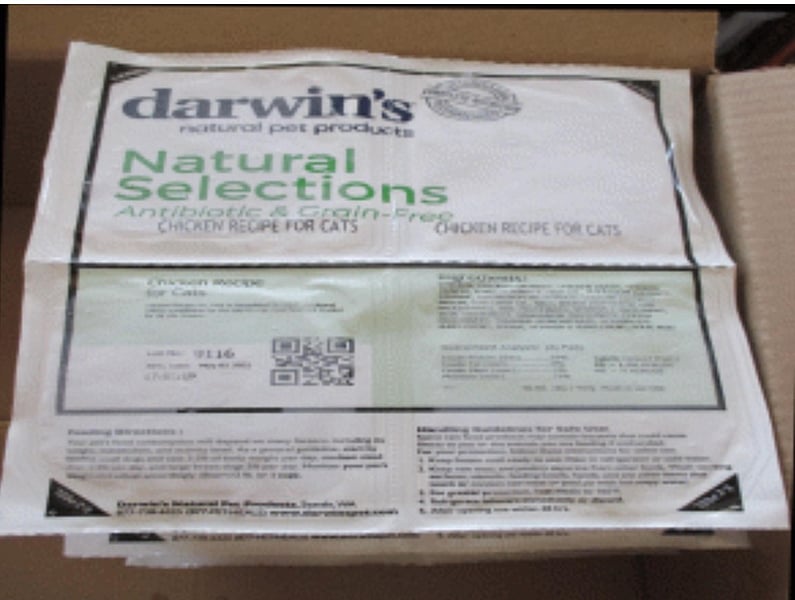(330) 876-1228
8507 Main StreetKinsman, OH 44428
(330) 876-1229

Cat owners should not feed their pets certain lots of Darwin's Natural Pet Products, the U.S. Food and Drug Administration warns.
Some lots of the raw cat food tested positive for salmonella and were associated with illness in three kittens, the agency said in a news release.
Salmonella can cause illness and death in both humans and animals and is especially risky for those who are very young, very old or have weak immune systems. Symptoms of infection with this bacterium include diarrhea, fever and abdominal cramps, according to the U.S. Centers for Disease Control and Prevention.
The FDA alert is for two lots of the products.
The first is Darwin's Natural Pet Products Natural Selections Antibiotic & Grain Free Chicken Recipe for Cats, Lot 9116, with a manufacturing date of May 2. The other is Darwin's Natural Pet Products Natural Selections Antibiotic & Grain Free Turkey Recipe for Cats, Lot 9121, manufactured on May 4.
These products are sold inside white and clear plastic packages with blue and green labeling. They each weigh 2 pounds and have four separate units. They are sold and stored frozen, so many may still be in consumers' freezers.
Consumers can find the lot code on the front lower left unit of the package, the FDA said.
Throw away any products that have these lot numbers. If you can't be sure of the lot code, throw those products away. Do not put them where wildlife can access them.
Before issuing the warning, the FDA collected and analyzed unopened samples of products from the two lots after three kittens from a single household developed diarrhea. A stool sample from one of the kittens tested positive for salmonella. A fourth kitten did not eat the food and did not become sick.
In doing genetic sequencing of the salmonella in the two products, the FDA found the turkey product contained Salmonella typhimurium, while the chicken product contained Salmonella typhimurium and Salmonella Kentucky.
The FDA is involved in the investigation because pets who are sick with salmonella can pass the bacteria to their human companions, even if they don't appear ill, the agency said. In past cases, humans and animals have gotten sick from exposure to salmonella-contaminated pet foods.
Some people who have salmonella will need to be hospitalized, though most recover without treatment. Pets do not always have symptoms when infected, but signs can include vomiting, diarrhea or bloody diarrhea, fever, loss of appetite and decreased activity level. Pets can shed the bacteria in their feces, even if they don't appear sick, the FDA said.
These products are manufactured by Arrow Reliance Inc. The company does business as Darwin's Natural Pet Products, selling the pet foods online to consumers.
Although the FDA has recommended Arrow Reliance Inc. voluntarily recall these products and notify the public, the company has not, the agency said.
If you have had these products in your home, clean any refrigerators or freezers where the product was stored. Clean and disinfect all bowls, utensils, food prep surfaces, pet bedding, litter boxes, toys, floors and any other surfaces that the food or pet may have had contact with.
Clean up the pet's feces in places where people or other animals may become exposed. To prevent spread from an infected animal, it's particularly important to clean up the animal's feces in yards or parks where people or other animals may become exposed, in addition to cleaning items in the home.
After handling the product or cleaning up potentially contaminated items and surfaces, it is important to thoroughly wash your hands, the FDA said.
If you are showing signs of salmonella infection, contact your health care provider. If your pet is showing signs, contact your veterinarian.
Veterinarians can have pets tested for salmonella through the Veterinary Laboratory Investigation and Response Network (Vet-LIRN Network) if the pet is from a household where someone is infected with salmonella.
Report complaints about pet food products electronically through the Safety Reporting Portal or by calling your state's FDA Consumer Complaint Coordinators.
More information
The U.S. Centers for Disease Control and Prevention has more on salmonella.
SOURCE: U.S. Food and Drug Administration, news release, Aug. 5, 2022
